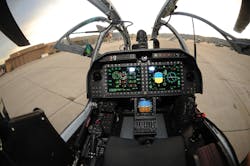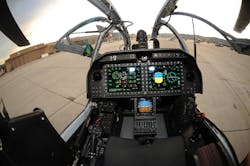Physical Optics to provide military distributed processing mission computer
Aircraft mission computer experts at Physical Optics Corp. in Torrance, Calif. are developing a deployable military avionics subsystem to decentralize mission data processing across several distributed processing nodes under terms of a $32.8 million five-year order.
Officials of the U.S. Naval Air Warfare Center Aircraft Division in Lakehurst, N.J., are asking Physical Optics experts to enhance the experimental Joint Avionics Reconfigurable Visual Information System (JARVIS) so it is ready for military test and demonstration.
The JARVIS project seeks to increase avionics mission processing interface speeds and lower costs compared to today’s monolithic systems by decentralizing mission data processing across several distributed processing nodes.
Physical Optics developed a prototype JARVIS system under a small business innovation research (SBIR) phase-one contract. The system seeks to address the Navy’s need for a miniaturized, fault-tolerant, decentralized mission processing.
JARVIS incorporates Physical Optics-developed components and existing commercial- and modified off-the-shelf components to offer superior fault tolerance and decentralized aircraft mission processing, Navy officials say.
In the first phase of the JARVIS project, Physical Optics demonstrated the feasibility of a miniaturized virtually and physically reconfigurable system to enable military aircraft crews to maintain situational awareness even when more than 50 percent of the processing nodes fail.
In this second phase, Physical Optics will demonstrate a prototype aircraft mission processing system that will comply with Future Airborne Capability Environment (FACE) and Modular Open Systems Approach (MOSA) industry standards such that it will be capable of being certified for flight.
Physical Optics will mature the JARVIS prototype through engineering manufacturing and development (EMD) to technical readiness level 8, which means the actual system will have been completed and qualified through test and demonstration.
Physical Optics will mature JARVIS technology such that it will operate in conformance with the FACE standard, incorporate software re-configurability, leverage distributed processing, and address cyber security requirements.
On this order Physical Optics will do the work in Torrance, Calif., Indianapolis, and Atlanta, and should be finished by July 2023. For more information contact Physical Optics Corp. online at www.poc.com, or the Naval Air Warfare Center Aircraft Division-Lakehurst at www.navair.navy.mil.

